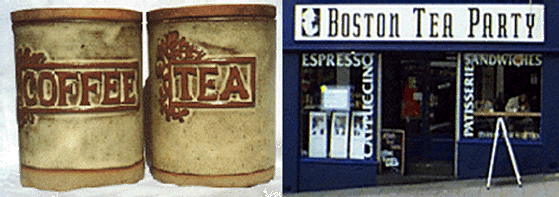

|
|
|
|
|
|
|
|
|

Caffeine is a drug that everyone knows about, most people use regularly, and few people truly understand. There has been no other drug in history whose use is so widespread and universally accepted. It is consumed by 90 percent of the world's population, and is avoiding the modern day scrutiny, disdain and outlaw endured by the many other addictive psychoactive substances that have been isolated from plants. As one Daily Telegraph journalist put it, "We can imagine alcohol and nicotine wondering whether they can get in touch with the people who handle caffeine's PR".¹

The author's favourite kitchen pots,
and favourite coffee house, The Boston Tea Party, Park Street, Bristol
Of course, caffeine has not always had it so easy. A late-comer to the Western world, initial attempts to outlaw the caffeine containing substances of coffee, tea, cola and chocolate were put into action by leaders of many west European countries. King Charles II of England banned coffee houses in 1676, in fear that they were breeding grounds for political and social unrest (his father King Charles I was beheaded and himself forced into exile by the Civil War just a few years previously). The ruling lasted just eleven days.
Similar circumstances in the neighbouring countries resulted in caffeine taking hold in Europe, as it had in Asia, parts of Africa and South America, to become a widespread dietary substance. Nowadays, cafe, from the French word for "coffee", forms part of our vocabulary for "meeting place, somewhere to exchange ideas". Consider cybercafes, a forum where like-minded people across the globe can discuss issues and thoughts, not actually a place where you can purchase coffee at all.
Caffeine is a subject (and substance) close to
my heart, too. An undergraduate chemist at the University of Bristol, I
was brought up as a tea drinker, only evolving a love for coffee later
in life when University allowed me access to some of the best coffee shops
in the area (the Boston Tea Party, pictured above, being the best). A place
to relax, meet your friends and discuss the day's news, the coffee house
became more to me than just a house that served coffee. This web site is
devoted to the wonderful compound and its effects. Enjoy...
¹ John Lanchester writing for The Daily Telegraph, Arts and Books Supplement, 5th May 2001, p.A3
Images used with full permission
from the following source:
Photographs by Simon Tilling (author
of website) personal collection